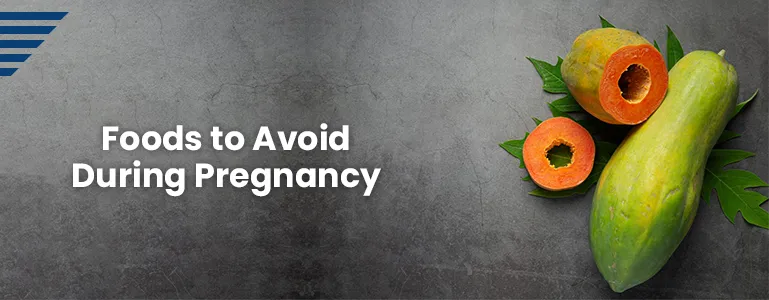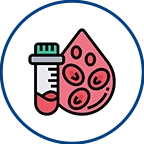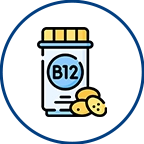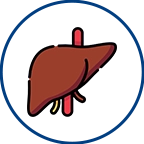Foods to Avoid During Pregnancy

Pregnancy is a transformative journey that calls for extra attention to nutrition. While the focus is often on what to eat, it's equally important to be aware of foods that should be avoided during this crucial time. Certain foods carry the risk of harming both the mother and the developing baby. In this thorough guide, we'll look into the foods to stay away from throughout pregnancy in order to ensure a secure and healthy pregnancy.
Home Sample Collection
The Importance of a Safe Diet
Maintaining a safe and balanced diet during pregnancy is paramount, as the growing fetus relies on the mother's intake for nourishment. Some foods can harbor harmful bacteria, pose potential allergens, or contain substances that may negatively impact fetal development. Being mindful of what not to consume can help mitigate risks and ensure a smooth pregnancy journey.
Foods to Avoid During Pregnancy
Raw Seafood : Raw or undercooked seafood like sushi, oysters, and clams can expose pregnant women to harmful bacteria and parasites. Opt for cooked seafood options to reduce the risk of infections.
Unpasteurized Dairy : Unpasteurized dairy products, such as certain soft cheeses and milk, can contain harmful bacteria like Listeria. Stick to pasteurized dairy options to reduce the risk of bacterial infections.
Raw or Undercooked Eggs : Raw or undercooked eggs might carry Salmonella bacteria, which can lead to food poisoning. Ensure eggs are thoroughly cooked before consuming.
Raw Sprouts : Raw sprouts, including alfalfa, clover, radish, and mung bean sprouts, can harbor bacteria like E. coli and Salmonella. Cooking sprouts can help reduce the risk.
High-Mercury Fish : Mercury consumption can negatively impact the baby's nervous system development.
Caffeine : While moderate caffeine intake is generally safe, excessive consumption should be avoided. Limit tea, coffee, and other caffeinated beverages to a reasonable amount.
Processed Meats : Processed meats can carry Listeria bacteria. If you choose to consume them, ensure they are heated until steaming to kill any potential bacteria.
Artificial Sweeteners : Some artificial sweeteners, like saccharin, should be avoided during pregnancy. Opt for natural sweeteners like honey or moderate amounts of stevia.
Alcohol : Developmental problems and fetal alcohol spectrum disorders can result from drinking alcohol during pregnancy. It's best to avoid alcohol entirely.
Excess Vitamin A : High levels of vitamin A, found in certain animal liver and supplements, can be harmful to the developing fetus. Stick to recommended daily intake levels.
Unwashed Produce : Vegetables and fruits should be thoroughly washed to remove any potential pesticides or harmful bacteria that could lead to foodborne illnesses.
Raw Meat and Poultry : Raw meat and poultry can carry harmful bacteria like Toxoplasma, E. coli, and Salmonella. Cook all meats to proper internal temperatures.
Unpasteurized Juice : Like unpasteurized dairy, unpasteurized juice can carry harmful pathogens. Opt for pasteurized juices to reduce the risk of contamination.
Certain Herbal Teas : Some herbal teas, like those containing black or blue cohosh, should be avoided due to their potential to stimulate uterine contractions.
Excessively Spicy Foods : While moderate spice is usually safe, consuming extremely spicy foods may lead to discomfort or heartburn during pregnancy.
Safe Alternatives and Conclusion
During pregnancy, it's crucial to prioritize both your own well-being and the health of your developing baby. By being aware of the foods to avoid and making informed choices, you can significantly reduce potential risks. Opt for safer alternatives, such as cooked seafood, pasteurized dairy, and a balanced diet rich in fruits, vegetables, lean proteins, and whole grains.
Consulting with a healthcare provider can provide personalized guidance tailored to your specific dietary needs and preferences. Remember, a healthy diet is an essential component of a successful pregnancy journey, ensuring the best possible start for both you and your baby.
Frequently Asked Questions
Why do I need to be cautious about my diet during pregnancy?
Pregnancy is a sensitive period, and certain foods can pose risks to both your health and your baby's development.
Can I eat raw fish like sushi while pregnant?
It's best to avoid raw fish during pregnancy due to the risk of harmful bacteria and parasites. Opt for fully cooked fish instead.
Are all types of seafood safe to consume?
High-mercury fish, like shark and swordfish, should be avoided. Choose low-mercury options like salmon and shrimp.
Can I enjoy deli meats during pregnancy?
Deli meats can carry the risk of listeria contamination. If you choose to eat them, ensure they're heated to steaming first.
Is caffeine safe during pregnancy?
Limited caffeine is generally considered safe. However, excessive intake should be avoided. Opt for decaffeinated options when possible.
Can I eat runny or undercooked eggs?
It's safer to fully cook eggs to reduce the risk of salmonella infection.
Are herbal teas safe?
Some herbal teas, like chamomile and peppermint, are generally considered safe in moderation. However, consult your healthcare provider.
Is alcohol completely off-limits?
Yes, it's recommended to avoid alcohol during pregnancy, as it can harm your baby's development.
Should I be concerned about artificial sweeteners?
Most artificial sweeteners are considered safe in moderation. However, it's best to choose natural sweeteners like honey.
What about unpasteurized products?
Avoid unpasteurized dairy and juices, as they can carry harmful bacteria.
Are there fruits and vegetables to be cautious about?
Thoroughly wash produce to remove dirt and bacteria. Avoid unwashed items to reduce the risk of contamination.
Should I be concerned about nuts and nut butters?
Nuts and nut butters are safe unless you have allergies. They provide healthy fats and protein.
Book Appointment
Our Locations Near You in Hyderabad
3KM from Banjara Hills
1.9KM from Yusufguda
3KM from Madhura Nagar
5KM from Shaikpet




